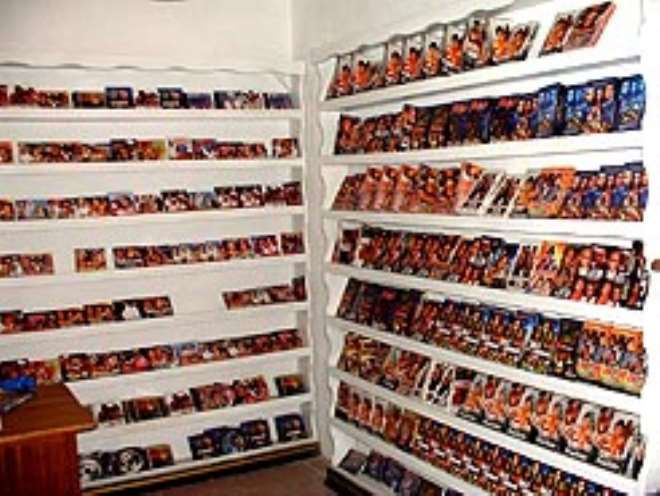Nollywood Comes to Jamaica
Krista Henry, Staff Reporter
MANY JAMAICANS have tuned in to the life and culture of Africa through the widespread distribution of Nigerian films on DVDs.
As one avid watcher, Stacysaid, movies such as Tom & Jerry, Baby Guard, Blood Sister 1 and 2, Games Women Play, American Dreams and many more are "spreading like wildfire". Pirated copies of these movies are commonly sold on the streets.
Megancommented, "Jamai-cans have really embraced these films. The storylines are believable, conflicts are there to hold your interest". She added that they are "more popular in young people, rural classes and the downtown crowd. Haven't really seen it among the upper-class people".
However, despite the explosion in viewership of these films, not many Jamaicans are aware of the sizzling film industry which they are sneaking a peek at. The Nigerian film industry, dubbed 'Nollywood', is rated as the third busiest in the world. And Tony Abulu, president of Filmmakers Association of Nigeria (FAN), stated that Nigeria is the the number one video producing country in the world.
COSTS
He is also adamant that all the African movies Jamaicans are seeing come from Nigeria, as that country produces more films than any other African country. Cost is a factor in both mass production and piracy. "They have become popular all over the world," Abulu said. "Whereas other African countries spend a lot more money making their films, Nigeria spends US$50,000 (each); the others spend U.S. $200,000. The other countries spend their time producing for the United States and Europe, the Cannes Film Festival for example. Nigeria seeks to tell stories for and about Africans."
Blood Sisters 1 and 2 are typical of this approach. The films takes place in an African village with Africans doing all the roles. The films explore the superstitions and traditions of Nigerians, including arranged marriages and the accompanying 'bride price' each prospective male suitor is expected to pay a family for marriage.
POPULARITY
The Nigerian High Commission in Jamaica has heard of the popularity of the pirated films. Sylvester Alabi, Minister Counsellor of Information at the High Commission, said "The films are a product of piracy, which is wrong as the producers are not benefiting. Honestly, it is quite widespread, massively pirated. In Half-Way Tree you see them all over the place," he said.
The High Commission has no idea how the films are coming into Jamaica and hoping to open a legitimate channel through which the films can be accessed, in the hope that the rate of piracy will decrease.
Tony Abulu has also heard of the sweeping bootlegging of the DVDs, not only in Jamaica, but Trinidad as well.
He said when the president of Nigeria went to Trinidad, his wife requested to see African movies and was quite upset when none were provided. Abulu claimed the movies are so popular that places in Liberia have been shut down when Nigerian movie stars come to town.
Although in existence for 30 years, the Nigerian movie industry has really hit top gear during the last 12, as digital cameras, and other relatively new technology has had a huge impact. All the films are shot with digital cameras which help reduce costs, especially as the filmmakers have little funding. And whereas the early films dealt mainly with folklore and superstitions, the newer ones tackle more diverse themes.
INFORMATION
"Africa has to be very, very careful in the way it presents itself," Abulu said. "People in the diaspora need authentic information about Africa, not sensational information. Directors make films that are positive, inspirational, in which good always conquers over bad." So although Blood Sisters deals with the murder of one sister by the other and the eventual suicide of the murderess, the movie ends with a strong and happy family unit.
The stories are deliberately more relevant to African culture, in an effort to rewrite the previous negative images of Africa which were projected. And it seems to be working, as one Jamaican viewer said, "You learn more about the country. The stories are based in the villages of these countries, surrounding issues within their context." Alabi agrees stating that, "It is good for cultural awareness; people begin to know about the people in Nigeria."
One cultural Nigerian movie that has made an impact in the Caribbean is Abulu's own Back to Africa. The movie is about a young African American Caribbean woman who goes to Africa to find her father, although she knows only his last name. The film delves deeper and deeper into African culture as she searches for her father.
Abulu believes that film-makers have a very formidable task and a certain level of responsibility, as Africa needs to be portrayed from an African perspective and not from the Western way of thinking of Africans as 'primitive' and 'witchdoctors'. In a number of ways Jamaica faces the same task, in trying to portray the island in a positive manner. Abulu describes Dancehall Queen, in which a number of his companions not being exposed to Jamaica's culture saw the island negatively.
AFRICAN CULTURE
One of the goals of the films and FAN is to propagate African culture more. "If the black diaspora can come together in an understanding, things can improve to change the destiny of the black world. If Nigeria can show people in Jamaica the way, Jamaicans may want to go out to see Africa and experience it for themselves," Abulu said.
His advice to Jamaican filmmakers is to show the positive side in all their stories so as to inspire interest in the island. He said Nigerians are very familiar with Jamaican music, through Bob Marley and others, but they are not familiar with the people, culture or history of Jamaica. Films are therefore an important tool in spreading this knowledge.
FAN is looking forward to making movies in Jamaica, Trinidad and the rest of the Caribbean, with hopes to fund Jamaican filmmakers to make positive films. According to Abulu, "Vision is there; we are happy that our Caribbean brothers and sisters are watching our films, communicating, getting to know each other. We are looking forward to officially coming to Jamaica and launching the movies here."
What started out as simple curiosity has grown into quite a local phenomenon. The growth of these pirated films may well develop into a learning experience for the masses; a means of teaching about Nigeria and African culture. The bootlegging and joyful movie watching may well blossom into a mutually beneficial relationship between the Caribbean diaspora and Africa.
Latest News
-
 "If You're For Me, I Am For You" - Cubana Chief P
"If You're For Me, I Am For You" - Cubana Chief P -
 "3 Days To Go" - Femi Adebayo Urges Fans To Get S
"3 Days To Go" - Femi Adebayo Urges Fans To Get S -
 "Stop Asking Me Questions About Speed Darlington"
"Stop Asking Me Questions About Speed Darlington" -
 "Benue Is The Most Underdeveloped State I've Ever
"Benue Is The Most Underdeveloped State I've Ever -
 Stan Alieke Urges Young Professionals To Take Lin
Stan Alieke Urges Young Professionals To Take Lin -
 Chizzy Alichi Teases Fans With Baby Reveal, Promot
Chizzy Alichi Teases Fans With Baby Reveal, Promot -
 "I'm Not Wearing Makeup From July 4th Till Decemb
"I'm Not Wearing Makeup From July 4th Till Decemb -
 "Stop The Challenge Of Mocking Kids With Down Syn
"Stop The Challenge Of Mocking Kids With Down Syn -
 Regina Daniels Celebrates Sons As They Mark Birthd
Regina Daniels Celebrates Sons As They Mark Birthd -
 Speed Darlington Threatens To Sue NAPTIP For Defam
Speed Darlington Threatens To Sue NAPTIP For Defam














